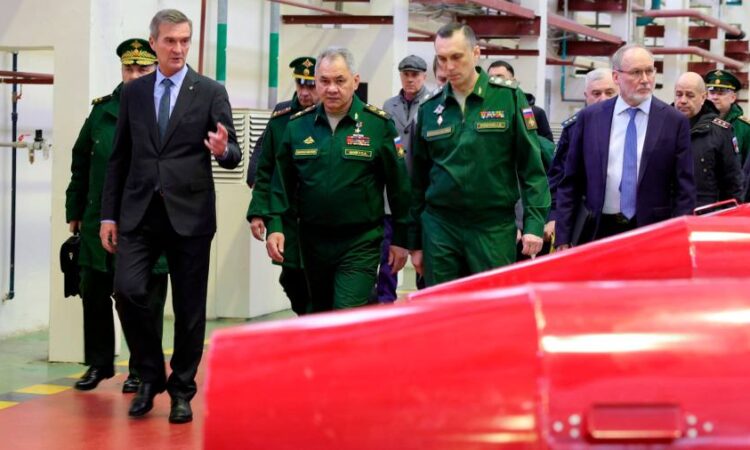
Vladimir Putin has said Russia plans to deploy tactical nuclear weapons in Belarus, marking Moscow’s latest attempt to use the threat of a nuclear war to ramp up tensions with the US and Nato over the invasion of Ukraine.
Russia’s president said work would be completed on building storage units for tactical nuclear weapons in Belarus on July 1, a move he likened to US nuclear deployments in Europe.
Though Putin said Russia would not transfer control of the tactical nuclear weapons to Belarus or violate its nuclear non-proliferation obligations, the decision is one of the Kremlin’s most significant steps with its arsenal since it invaded Ukraine more than a year ago.
Putin said the deployment was in response to a longstanding request from Belarus’s autocratic leader Alexander Lukashenko, who has allowed Russia to use the country as a launch pad for attacks on Ukraine, thereby moving his country deeper into the Kremlin’s embrace.
“There is nothing unusual here: first of all, the US has been doing this for decades,” Putin said. “They placed their tactical nuclear weapons in six different allied Nato countries in Europe. [ . . . ] we have agreed to do the same thing, without, I stress, violating our international non-proliferation obligations,” he added.
“They have [tactical nuclear weapons] in certain countries, prepare the delivery systems, and train the crews. We’re planning to do the same thing.”
It was unclear when work began on the nuclear storage facilities in Belarus or when Russia would deploy the weapons there. Putin said Russia had already equipped 10 Belarusian aircraft with the capability to carry tactical nuclear weapons. Russia will begin training Belarusian forces on the Iskander missile complex, which can carry the tactical nuclear weapons, in April, Putin added.
Ukraine was quick to condemn the plans. “The Kremlin took Belarus as a nuclear hostage,” Oleksiy Danilov, chair of Ukraine’s national security council, wrote on Twitter.
“Putin is too predictable,” wrote Mikhail Podolyak, a senior adviser in president Volodymyr Zelenskyy’s office. “Making a statement about tactical nuclear weapons in Belarus, he admits that he is afraid of losing and all he can do is scare with tactics.”
The Russian president’s comments came only days after he signed a joint statement with Chinese leader Xi Jinping in which Moscow and Beijing declared: “All nuclear powers must not deploy nuclear weapons beyond their national territories and must remove all nuclear weapons they have deployed beyond their borders.”
China’s backing of Russia’s stance has given Putin an important bulwark against western sanctions pressure, though Xi and US president Joe Biden opposed the “use or threat of use” of nuclear weapons in Ukraine last November.
The US has warned China against providing Russia with weapons to use on the battlefield in Ukraine, though there is no indication as yet Beijing has decided to do this.
In another clip from the interview broadcast on Sunday, Putin said: “We are not creating any military alliance with China. Yes, we have military-technical co-operation. We’re not hiding it. That’s all transparent, there’s nothing secret there.”
Putin has regularly made veiled threats to use “all the means at our disposal” to defend Russia’s territorial conquests and warn off western support for Ukraine’s military.
In the autumn, when nuclear tensions with the west were at a peak, Putin considered using a tactical nuclear weapon in Ukraine but eventually decided it would give Russia no real battlefield advantage, according to people familiar with the matter.
Unlike strategic nuclear warheads — which are designed to be launched from thousands of miles away on submarines, long-range bombers or intercontinental ballistic missiles, and can obliterate entire cities — tactical nuclear weapons carry a smaller payload for destroying targets in a specific area.
Whereas the US gave up all but 230 of its tactical nuclear warheads after the end of the Cold War, Russia still maintains 2,000 of them and can deploy them from some conventional systems, such as the Iskander missile complex.
The Russian president said he had made the decision after the UK announced earlier this week it had supplied anti-tank rounds containing depleted uranium to Ukraine, a move he framed as part of a nuclear escalation of the conflict.
The US and the UK dismissed Putin’s claim, saying the rounds — which are more dense than lead and valued for their armour-piercing capabilities — only have conventional uses.
US National Security Council spokeswoman Adrienne Watson said the US has not seen any signs Russia is moving towards using a nuclear weapon.
“We have not seen any reason to adjust our own strategic nuclear posture nor any indications Russia is preparing to use a nuclear weapon,” Watson said.
She added: “We remain committed to the collective defence of the Nato alliance.”
A US official said Putin’s announcement could be political signalling in response to Belarus Freedom Day, which is marked by the country’s opposition. The US on Friday imposed sanctions and visa bans on Belarusian officials and others to recognise the holiday.






